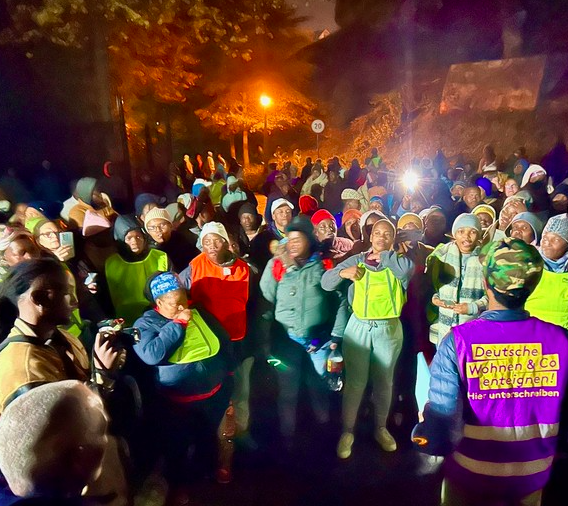A large group of housing activists gathered outside Premier Alan Winde’s official residence early on Monday morning. They were demanding that he address them after “numerous failed attempts to engage”. Photo: Matthew Hirsch
By Matthew Hirsch
- Hundreds of protesters gathered outside Leeuwenhof, Western Cape Premier Alan Winde’s official residence, in the early hours of Monday morning.
- They accused Winde of refusing to engage with them except on his terms and said they had brought “the meeting to him”.
- In a statement on Sunday MEC of Infrastructure Tertuis Simmers had criticised the activists; Winde accused them of obstructing his government’s efforts to address housing issues.
Hundreds of protesters gathered outside Leeuwenhof, Western Cape Premier Alan Winde’s official residence, in the early hours of Monday morning. When GroundUp arrived shortly after 2am, there was already a large crowd. They carried banners and posters that read: “I am an occupier, stop evictions” and “End white property power”.
Police reinforcements arrived at 2:40am and there was a heavy downpour at 3am, but this did not deter the protesters, who continued to sing struggle songs.
The protesters’ demands included: provincial-owned parking sites and the Tafelberg site in Sea Point to be released for social housing, and transparency on the 353 Main Road public participation process.
Buhle Booi, of Ndifuna Ukwazi, said the protest came after numerous attempts to engage the Premier. Booi said the Western Cape had a housing backlog of over 600,000.
“We’ve asked him to come and engage with the residents on the housing crisis. He put conditions on the engagements.”
In a letter to Reclaim the City, Winde wrote: “I am also not willing to meet with you until you condemn the ongoing illegal occupation of the Helen Bowden Nurses Home and other properties which have been earmarked for affordable housing in central Cape Town and make every effort not to further hamper our efforts to develop these sites for our most vulnerable residents.”
“Developing these sites will contribute greatly to redressing spatial apartheid and will offer those most in need the dignity they deserve.”
Booi said, “We are left with no choice but to come and bring the meeting to him because he doesn’t want to engage with us. We need answers.
“We will not join that party of criminalising and condemning the poor. People have [resorted] to occupations because of the failed housing system. The state must see these occupations as solutions.”
Karen Hendricks, of Reclaim the City, said, “We know he doesn’t want to engage with us. It was a decision that we took that if he’s not coming, then we are coming to him and holding him to account.”
Mzwethemba Sofika, an activist from Mfuleni, said, “We are not going to sleep. Wherever he is going to, we will be there until he gives us the answers.”
As day broke, more police arrived. Police asked protestors to clear the entrance before escorting out officials. Winde did not engage with the protestors, who had been there for at least five hours.
Winde’s office said: “The Premier’s Office is not offering comment on this [protest] at this stage.”
In a statement on Sunday, MEC of Infrastructure Tertuis Simmers had criticised the activist groups. “It is concerning that these activist groups that claim to fight for spatial redress and the poor, are seemingly working against our efforts to deliver viable housing opportunities, especially in the City of Cape Town.
“Since 2019, unlawful occupations and land invasions imposed on the Western Cape Department of Infrastructure an expenditure of R987-million to secure our housing development projects. This does not only put tremendous strain on our budgets, but it robs deserving beneficiaries of housing opportunities.”
In the same statement, Winde said it was unacceptable that certain activist groups were “misleading” the public on housing issues.
“This does not help matters and only serves to divide us when we should be working together to find multiple solutions and approaches to meet our housing needs – all of us: government, residents, the private sector have a role to play.”
Follow African Insider on Facebook, Twitter and Instagram
Picture: GroundUp
For more African news, visit Africaninsider.com


